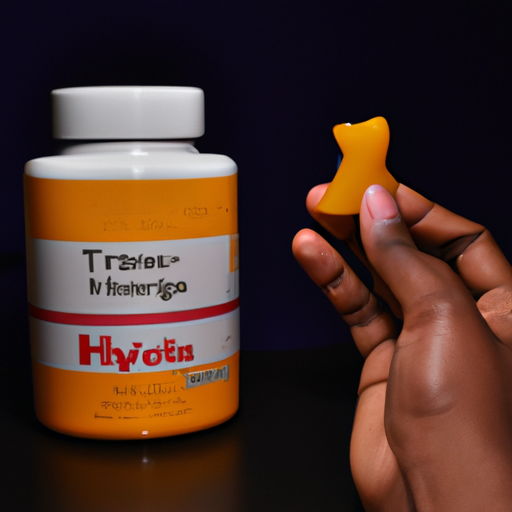As someone who has been dealing with hypothyroidism for many years, I understand the importance of staying informed about possible interactions between medications and supplements. A common question that arises is whether turmeric can impact thyroid medication.
As turmeric is becoming increasingly popular for its anti-inflammatory and antioxidant properties, it’s important to understand any potential risks and benefits when taking it in conjunction with thyroid medication.
In this article, I will explore the potential interactions between turmeric and thyroid medication, as well as the risks and benefits of incorporating turmeric into your routine. While some studies suggest that turmeric may interfere with thyroid medication absorption, others show promising results for its potential to support thyroid function.
By understanding the research and consulting with your doctor, you can make an informed decision about whether or not turmeric is right for you.
Key Takeaways
- Turmeric may interfere with the absorption of thyroid medication, leading to hypothyroidism or increase the effects of thyroid medication, leading to hyperthyroidism.
- More research is needed to fully understand the effects of turmeric on thyroid function and medication.
- Consulting with a doctor before taking turmeric or any other supplement while on thyroid medication is crucial.
- Ginger and cinnamon are alternatives to turmeric that can be used in cooking.
Understanding Thyroid Medication
Let’s take a closer look at how thyroid medication works and how it interacts with other substances like turmeric.
Thyroid medication is used to treat an underactive thyroid gland, also known as hypothyroidism. The most common types of thyroid medication are levothyroxine and liothyronine. These medications work by replacing or supplementing the thyroid hormones that your body is not producing enough of.
The dosage of thyroid medication is carefully calibrated based on the individual’s hormone levels, so it’s important to take the medication as prescribed by your healthcare provider. While thyroid medication can be very effective, it can also come with side effects. Some common side effects include weight loss or gain, hair loss, heart palpitations, and anxiety.
It’s important to speak with your healthcare provider if you experience any of these symptoms. Additionally, it’s important to avoid taking any substances that may interact with thyroid medication, such as calcium supplements, iron supplements, and some medications used to treat acid reflux.
Now, let’s move onto discussing what turmeric is and how it may affect thyroid medication.
What is Turmeric?
Turmeric’s golden color and unique flavor make it a popular spice used in many dishes around the world. Beyond its culinary uses, turmeric has been used for centuries in traditional medicine for its potential health benefits. Here are a few examples:
- Curcumin, the active ingredient in turmeric, has been found to have anti-inflammatory effects in the body.
- Curcumin may also act as an antioxidant, helping to protect cells from damage caused by free radicals.
- Some studies suggest that curcumin may help to prevent the development and spread of certain types of cancer cells.
While these potential benefits are intriguing, it’s important to note that more research is needed to fully understand the effects of turmeric on the body. In the next section, we’ll explore the potential interactions between turmeric and thyroid medication.
Potential Interactions Between Turmeric and Thyroid Medication
Did you know that taking turmeric supplements while on thyroid medication may impact your body’s ability to absorb the medication properly, potentially leading to negative health consequences? It’s important to be aware of the potential interactions between turmeric and thyroid medication.
If you are taking thyroid medication, it is recommended that you speak with your healthcare provider before adding turmeric to your supplement regimen.
One potential issue with taking turmeric while on thyroid medication is that it may interfere with the body’s ability to absorb the medication properly. This can cause the thyroid hormone levels to become imbalanced, leading to potential side effects such as fatigue, weight gain, and difficulty concentrating.
It’s important to note that the severity of these potential side effects may vary depending on the individual and their turmeric dosage. In the next section, we will explore studies on turmeric and thyroid medication to gain a better understanding of the potential risks and benefits.
Studies on Turmeric and Thyroid Medication
You may be interested to know that studies have shown a potential interaction between turmeric and thyroid medication. Turmeric, a spice commonly used in cooking and as a dietary supplement, has been found to affect hormone levels and thyroid function.
Here are some key points to consider when it comes to turmeric and thyroid medication:
- Turmeric may increase the effects of thyroid medication, leading to hyperthyroidism.
- Turmeric may interfere with the absorption of thyroid medication, leading to hypothyroidism.
- More research is needed to fully understand the effects of turmeric on thyroid function and medication.
It’s important to consult with your doctor before taking turmeric or any other supplement while on thyroid medication. Your doctor can help you determine if turmeric is safe and appropriate for you to take based on your individual health needs and medication regimen.
Remember, it’s always best to consult with your doctor before making any changes to your medication or supplement regimen. Your doctor can provide personalized guidance and help you make informed decisions about your health.
Consult with Your Doctor
Make sure to schedule an appointment with your doctor to discuss the potential interactions between any supplements you’re taking and your thyroid medication. Your doctor’s advice is crucial in ensuring that your medication is effective and safe for you. They can recommend medication adjustments or provide alternative supplement options to ensure that turmeric doesn’t interfere with your thyroid medication.
It’s important to note that while turmeric has several health benefits, its interaction with thyroid medication may vary from person to person. Therefore, it’s always a good idea to consult with a healthcare professional before incorporating it into your routine.
Now, let’s explore some ways to incorporate turmeric safely into your diet without compromising your thyroid medication.
Ways to Incorporate Turmeric Safely
Get ready to spice up your meals and boost your health with these creative and safe ways to add turmeric to your diet. Turmeric has anti-inflammatory and antioxidant properties, making it a popular ingredient in health supplements and natural remedies. However, if you’re taking thyroid medication, consult your doctor before incorporating turmeric into your diet as it may interact with certain medications.
One way to enjoy the benefits of turmeric safely is by adding it to your meals. Turmeric is a versatile spice that can be used in a variety of dishes, from curries to roasted vegetables. Try adding a pinch of turmeric to your scrambled eggs or smoothies for a boost of flavor and health benefits. You can find recipes online that feature turmeric as a star ingredient, such as turmeric chicken or turmeric roasted cauliflower.
Another option is to take turmeric supplements, which can be found in capsule or powder form. However, check with your doctor before starting any new supplements, especially if you’re taking medication.
As you explore the benefits of turmeric, remember that there are alternatives to this powerful spice. Let’s discuss some other natural ingredients that may be beneficial for your health.
Alternatives to Turmeric
Looking for other natural options to spice up your meals and boost your health? If you’re unable to use turmeric due to its potential interactions with thyroid medication, there are several alternatives you can use instead.
One option is ginger, which is a close relative of turmeric and has similar anti-inflammatory properties. Ginger is also commonly used in cooking and can be added to smoothies, teas, and stir-fries.
Another alternative to turmeric is cinnamon, which is known for its ability to regulate blood sugar levels and improve insulin sensitivity. Cinnamon can be used in sweet and savory dishes, such as oatmeal, roasted vegetables, and curries.
Other turmeric substitutes include garlic, cumin, and coriander, which are all commonly used in Indian and Middle Eastern cuisines. Experiment with these different spices to find your favorite and add some variety to your meals.
Now that we’ve explored some alternatives to turmeric, let’s dive into managing hypothyroidism and how to support your thyroid health.
Managing Hypothyroidism
When managing hypothyroidism, it’s crucial to attend regular check-ups with your healthcare provider.
This helps to ensure that your thyroid levels are within a healthy range and that your treatment plan is working effectively.
Finding the right treatment plan can take time, but with patience and guidance from your healthcare provider, you can successfully manage your condition and cope with any symptoms that may arise.
Importance of Regular Check-Ups
Don’t underestimate the importance of regular check-ups when managing your thyroid medication – they can be a lifesaver! As someone with hypothyroidism, I know how easy it can be to forget about scheduling appointments with your healthcare provider.
However, frequent check-ups are essential for ensuring that your medication dosage is correct and that your thyroid hormone levels are within a healthy range. The frequency of check-ups will depend on your individual needs, but typically, you should plan to see your doctor every 6-12 months.
The benefits of early detection cannot be overstated. Catching any changes in your thyroid function early on can prevent complications down the line, such as heart disease, infertility, and depression.
During your check-up, your healthcare provider will likely order blood tests to measure your thyroid hormone levels and adjust your medication dosage accordingly. Remember that managing hypothyroidism is a lifelong process, and regular check-ups are a crucial part of that process.
With proper monitoring, you can ensure that you’re on the right track to feeling your best and maintaining good health. Moving forward, let’s discuss how to find the right treatment plan for your individual needs.
Finding the Right Treatment Plan
To find the right treatment plan for you, it’s important to work closely with your healthcare provider and communicate any symptoms or concerns you may have. This is where the importance of communication comes into play. Thyroid disorders can be complex and require a holistic approach that takes into account your overall health and lifestyle. By communicating openly with your healthcare provider, you can work together to find the right combination of medication, dietary changes, and lifestyle modifications that work for you.
One tool that can help in this process is keeping a symptom diary. This can be a simple table with two columns and four rows, where you list your symptoms and rate their severity on a scale of 1-10. By tracking your symptoms, you can see patterns and identify triggers that can help guide your treatment plan. Remember, finding the right treatment plan is a collaborative effort between you and your healthcare provider. By taking an active role in your health and communicating your concerns, you can work towards managing your thyroid disorder and improving your overall quality of life. Moving forward, let’s discuss coping with symptoms without feeling overwhelmed.
Coping with Symptoms
Dealing with symptoms can feel like a rollercoaster ride, but there are ways to make the journey smoother. For those with thyroid issues, managing symptoms can be a daily challenge. Some of the most common symptoms include fatigue, weight gain, hair loss, and depression.
However, there are lifestyle changes that can help alleviate these symptoms. For example, regular exercise can boost energy levels and improve mood. Eating a balanced diet with plenty of fruits, vegetables, and whole grains can also help support overall health.
Additionally, it’s important to work closely with your healthcare provider to manage your symptoms. They may recommend medication adjustments or alternative treatments to help alleviate your symptoms. It’s important to stay informed and advocate for yourself, while also seeking support from family and friends.
By taking control of your symptoms and making positive lifestyle changes, you can improve your overall quality of life. Moving forward, it’s important to weigh the risks and benefits of any treatment options with your healthcare provider.
Risks and Benefits
The benefits and risks of taking turmeric alongside thyroid medication must be carefully considered. Turmeric has been known for its anti-inflammatory and antioxidant properties, which can be beneficial to those with thyroid disorders. However, it can also interfere with the absorption of thyroid medication, leading to decreased effectiveness. Therefore, it is important to consult with a healthcare provider before taking turmeric supplements while on thyroid medication.
To better understand the potential risks and benefits of taking turmeric alongside thyroid medication, let’s take a look at the following table:
| Benefits | Risks | Dosage Recommendations |
|---|---|---|
| Anti-inflammatory properties | Interference with thyroid medication absorption | Consult with healthcare provider |
| Antioxidant properties | Allergic reactions | Start with low dosage and gradually increase |
As you can see, there are potential benefits to taking turmeric alongside thyroid medication. However, there are also risks that must be considered. The dosage recommendations suggest that it is important to consult with a healthcare provider and start with a low dosage to minimize the risks and maximize the potential benefits.
Frequently Asked Questions
Can turmeric be used as a replacement for thyroid medication?
I cannot recommend turmeric as a replacement for thyroid medication. While some claim turmeric alternatives can regulate thyroid function, there is no scientific evidence to support this. Turmeric dosage may also vary.
Are there any specific types or forms of turmeric that are better for thyroid health?
I’ve found that turmeric benefits thyroid health, but there isn’t a specific type or form that’s better. The recommended turmeric dosage is 500-2000mg per day, but always consult with a healthcare professional before starting any new supplement regimen.
Does cooking with turmeric have the same potential interactions with thyroid medication as taking supplements?
I explored the impact of cooking with turmeric versus taking supplements on thyroid medication. While there is limited research on the topic, it’s important to talk to a healthcare provider before using turmeric as a replacement for medication.
Are there any other natural supplements or remedies that can affect thyroid medication like turmeric can?
As someone who takes thyroid medication, I know the importance of being cautious with natural alternatives. Some natural supplements, like ashwagandha and kelp, have potential risks and can affect medication absorption. It’s important to speak with a healthcare provider before trying any new remedies.
Can turmeric help with other symptoms of hypothyroidism besides potential interactions with medication?
I have found that using turmeric for managing hypothyroidism symptoms can be effective. While it may not replace traditional medication, it can provide additional support. Studies have shown turmeric’s anti-inflammatory properties may reduce thyroid inflammation and improve overall thyroid function.
Conclusion
In conclusion, as someone who’s dealt with hypothyroidism, I understand the importance of managing this condition properly. While turmeric has potential health benefits, it’s important to consult with your doctor before incorporating it into your thyroid medication regimen.
Additionally, there are alternative ways to manage hypothyroidism, such as lifestyle changes and medication adjustments, that can be discussed with your healthcare provider.
Ultimately, the risks and benefits of adding turmeric to your thyroid medication routine will vary depending on your individual health needs. As with any supplement or medication, it’s important to prioritize safety and informed decision-making.
Remember to stay informed and work closely with your healthcare team to develop a plan that supports your overall health and wellbeing.










